- Home
- Juliet Marillier
Wolfskin Page 4
Wolfskin Read online
Page 4
That astonished Eyvind. He himself was always first in any endeavor—not reckless exactly, just blithely confident of his own strength. He did get hurt from time to time, but thought little of it. It did not worry him if folk laughed at him, not that they often did, since he tended to get things right the first time. And he was bigger than other people, which did help. He understood danger and guarded against it; he used his skis and his bow and his axe in the right way, cleanly and capably. Somerled’s need for privacy confused him. If others’ opinions mattered so much, why should Somerled trust him? He was, after all, the brother of a Wolfskin. That might be expected to engender fear rather than trust in a scrap of a boy like this.
As time passed, it became apparent to Eyvind that Somerled was attempting a kind of repayment, in the limited ways available to him. Eyvind would fall into bed exhausted after a long day’s work on the farm, and when he got up in the morning his boots would be cleaned of mud, dried, and waiting for him. Ingi would send her son out to the woodshed on a chill afternoon, and he would find Somerled there before him, frowning with effort as he loaded the logs onto the sledge. A choice cut of meat, served to their small visitor, would make its way unobtrusively to Eyvind’s own platter. Eyvind learned quickly that one did not thank Somerled for these small kindnesses. Any attempt to do so would be greeted either by a blank stare, or a furious denial that any favor was intended. So he learned merely to accept, and was rewarded, occasionally, with a tentative half-smile, so fleeting he wondered, afterward, if he had only imagined it.
Winter slowly mellowed into spring, and Eyvind learned a lesson in patience. Before the ice melted, Somerled could skate; before the snow turned to slush, he could move about on skis without falling. He did not play games, but it was apparent that this was through choice rather than lack of ability. The other boys’ eyes were more wary than scornful now as they passed over his small, dark figure. He made no new friends.
The milder weather brought fresh pastimes. It was easier to teach Somerled things now, because spring was a time for expeditions, and Eyvind was accustomed to going alone. Now, wherever Eyvind led, Somerled followed, and there were no others to watch and make fun of the boy’s errors. Accepting that this season’s ventures must be shorter and their pace slower, Eyvind set about ensuring his companion understood the essential rules of safety, and the basic skills of hunting and trapping. Somerled learned to start a fire with no more than a scrap of flint and a handful of dry grass. He learned to build a shelter from fallen branches and strips of bark. He tried spear and bow and struggled with both, for he had little strength in the arms and shoulders, though his eye was keen. Eyvind set easy targets, and praised each small success. They set snares for rabbits and brought home a steady supply. Somerled had a neat hand for gutting and skinning.
Eyvind was uneasy sometimes. He could see Somerled was trying hard, and it was plain to all that the lad was growing stronger and healthier, thanks to fresh air and exercise and good feeding. But he remained very quiet, and had not lost his habit of blurting out strange remarks. Once, by the fire, they had listened to Ingi’s tale of three brothers going to seek their fortunes, and had spoken of what the future might hold for themselves, and what they aspired to. One lad was eager to be a craftsman; he hoped to persuade Bjarni the silversmith to take him on. Another wanted to voyage far away to the lands in the south, where all the folk had skin as black as night. A third dreamed of catching the biggest fish that ever slipped in through the skerry-guard.
“No need to ask Eyvind what he’s going to do,” grinned redheaded Sigurd, son of Ingi’s senior housecarl. “We all know that.”
“If Thor accepts me, I’ll be the bravest Wolfskin that ever gave service,” Eyvind said quietly, his gaze intent on the hearth fire. “First in attack, heedless of peril, fierce and unassailable. That’s the only thing I want to do.”
There was a little silence. Not one of them doubted that this wish would come true. It seemed to have been understood among them since Eyvind was little more than a baby.
“I’m going to marry Ragna and have ten children,” Sigurd joked, and pigtailed Ragna cuffed him, blushing scarlet.
“What about you, Somerled?” Ingi asked kindly, perhaps feeling their young visitor had been overlooked. “What do you think you will become, when you are a man?”
Somerled looked up at her, his dark eyes opaque. “A king,” he said.
There were snorts of ridicule. The boys rolled their eyes at one another; the girls giggled with embarrassment.
“I don’t think you can just be a king,” Eyvind said gently. “I mean, a king is even more important than a Jarl. You’d have to be…well…” He hesitated. It was not possible to say, You’d have to be strong, brave, respected—all the things Somerled was not.
“You doubt me?” Somerled snapped. His small face all at once had the appearance of a savage creature at bay, the nostrils pinched, the eyes furious.
“Oh, come on, Somerled,” said Sigurd. “You know you’ll never be a king, that sort of thing’s only in stories. It’s a stupid thing to say.”
Ingi opened her mouth, perhaps to announce that it was bedtime, but Somerled spoke first.
“A man can be anything he wants to be,” he said, fixing Sigurd with a withering look. “You have still that lesson to learn. But you will not learn it, because you set your sights too low. One day you’ll be a bitter old man, looking back on a life wasted. Worse, you won’t even have the wit to recognize what you might have been. One day I will be a king, and you will still be a housecarl.”
Sigurd muttered something and made a gesture with his fingers. Then Ingi ordered them briskly off to bed, and the strange conversation was over.
Lying awake, Eyvind stared up at the thatch, where small creatures stirred with furtive rustling movements. After a while he said, “I didn’t mean it to sound like that. As if I thought you were lying. That wasn’t what I meant. I was just trying to be…”
“Helpful?” put in Somerled.
“Well, yes. I thought maybe you didn’t understand how hard it would be to—to do what you said. Almost impossible, I should think.”
Somerled sat up, his blankets held around him. “Nothing is impossible, Eyvind,” he said in his small, precise voice. “Not if a man wants it enough. How badly do you wish to be a Wolfskin?”
“More than anything in the world,” Eyvind said. “You know that; everyone does.”
“Exactly,” said Somerled. “So, you will be a Wolfskin, because you cannot see a future in which that does not occur. It is the same for me. I don’t expect to achieve what I want without hard work and careful strategy, of course.”
Eyvind was silenced. Somerled sounded extremely sure; so sure there was no challenging him.
“You must not doubt me.” There was an intensity in that statement that was almost frightening.
“I don’t, Somerled,” said Eyvind quietly and, to his own surprise, he found that he meant it.
The weather grew warmer, and Eyvind taught Somerled to swim. The boy practiced this new skill as he did all the others: doggedly, methodically, with no sign of enjoyment. He splashed about, making a gradual, floundering progress through the chilly waters of the fjord, while Eyvind swam and dived and practiced holding his breath under water. It seemed Somerled learned things not because he wanted to, but because he believed he must.
There was one exception, and it unsettled Eyvind. They set snares for rabbit or hare, clever nooses of cord placed so the quarry would wander in unawares and be caught by neck or limb, unable to free itself from the constricting loop. Usually the creatures would be dead by the time the boys checked the snare, but sometimes they were still alive, straining wild-eyed against the cord, or hunched, staring at their captors with a knowledge of death on their small faces. Eyvind preferred it when they were dead; it was better if the snare went around the neck. But he bore a short, heavy club and used it efficiently when he needed to. Somerled would not employ the club. He checked
his own snares, and Eyvind came across him sitting there quite still, watching with grave interest the small, struggling animal, whose frantic efforts to free itself had worn the flesh of its trapped leg almost to the bone. Perhaps Somerled was waiting for that moment he had once spoken of: a turning point, when it all went dark. Eyvind shivered, and then reached across and administered the merciful stroke of death. And Somerled was suddenly very angry indeed.
“Why did you do that? This one’s mine!”
Eyvind looked into the dark, fierce eyes and swallowed. “There’s no need to keep them alive,” he ventured cautiously. “It hurts them, you know, being strung up. This is the way it’s done. It’s the way I always do it.”
“And this is the way I do it,” said Somerled coldly. “Tend to your own snares.”
“Suit yourself,” said Eyvind, and then bent toward the limp bundle of gray fur, peering more closely. “What knot did you use?” he asked.
“Ah,” said Somerled, “you noticed. Want me to show you?” Deftly, his fingers moved on the hempen cord, flicking under, teasing out the bloodied ends until the complex rosette that formed the knot was unmade. “I invented this. You’ll find it quite useful, I think. It tightens swiftly at first, and then more gradually, and it’s very hard indeed to undo unless you know the trick. Here, watch me.”
It was a clever knot, and decorative. Eyvind practiced it several times, until he could remember the cunning sequence of under, over, across, through and around, which formed the flowerlike result. It would have its uses, certainly, but…
“I prefer the old one, for a snare,” he commented. “Quicker and cleaner.”
“Maybe.” Somerled glanced at him sideways. “But this is much more interesting.”
The season moved on, and a message came to Hammarsby that visitors were on the way: Eirik and Hakon, traveling from the north back to the Jarl’s court at Freyrsfjord. They’d be home for only one night. Ingi ordered a sheep slaughtered, and set her housecarls to baking.
Eyvind was saddling a horse, getting ready to ride out to meet his brother. In his mind was a joyful reunion on the track that skirted the fjord, a companionable ride back up the hillside while the two Wolfskins gave him all the news, then an evening’s feasting and tales. He could hardly keep the grin off his face. Somerled stood silent in the stable doorway, watching him intently. Eyvind had gotten used to Somerled being always there, a still shadow, eyes following his every move. At first, this had been deeply unsettling; now, he was so accustomed to it that he thought he might almost miss the other boy if he were not constantly present.
“I shouldn’t be long,” Eyvind said a little awkwardly.
“It’s all right.” Somerled’s voice was level, self-contained. “I know your brother means a lot to you. He is a Wolfskin; you aspire to be just like him. I can understand that.”
“I’m sorry…” Eyvind fell silent, not at all sure how to finish.
“Off you go,” Somerled said. “I can see every moment’s delay chafes you. Go on.”
“I’ll see you later, then.” Eyvind swung up onto the horse, the prospect of a gallop down the broad path under the firs already driving Somerled from his thoughts.
“Eyvind!” It was his mother’s voice, and a moment later Ingi appeared from the longhouse, drying her hands on her apron.
“What is it, Mother?”
“I’m sorry, son, I know you wanted to ride down to the fjord and meet them, but I need you to go over to Snorri Erlandsson’s. I’ve two milch cows ailing now, and I need him to have a look at them before another night passes. If we don’t nip this in the bud, the whole herd will be at risk. I’m sorry, Eyvind.” Ingi had seen the expression on her son’s face. “All the other boys are out helping with plowing and I just can’t spare anyone else.”
“It’s all right, Mother, of course I’ll go,” Eyvind said, swallowing his disappointment. The dairy herd was a substantial part of their livelihood; a chance to greet the Wolfskins on his own was nothing to this. He tried hard not to look as if it mattered to him.
“I’ll go.”
Ingi and Eyvind turned equally surprised faces toward Somerled. He had never ridden so far on his own; more significantly, he had never before volunteered for a task, though, when asked, he performed them in acquiescent, expressionless silence.
“I don’t think—” Ingi began.
“It’s too far—” Eyvind spoke at the same time.
Somerled looked at them, and they fell silent at the implacable darkness of those eyes in the small, pale face.
“I said, I’ll go. I know the way. I think I can be relied upon to deliver a simple message about some cows.”
Ingi glanced at Eyvind, brows raised. “Better if you go, Eyvind,” she said. “It’s a long way and not an easy ride.”
“No,” said Somerled. “I will go. Eyvind will ride down to meet his brother. Should I take the black mare or the gray pony?”
“I don’t know if—” Ingi began, clearly taken aback. Her word was law throughout Hammarsby.
“Take the gray,” Eyvind said, “she’s more reliable. And go by the upper track, it’s quicker in dry weather.” He looked at his mother. “You can trust Somerled,” he added.
“What is this, a conspiracy?” Ingi glanced from one boy to the other, a little frown on her brow. “Very well then, off you go. Somerled, are you sure you know the cattle doctor’s house? You must cross right over to the southernmost grazing fields, and then—you do? Good. You can ride back with Snorri; you should be home in time for supper. And you,” she addressed her youngest son, “straight there and straight back, and be glad you have such a loyal friend.”
“I am,” Eyvind said, and winked at Somerled. Somerled’s blank expression did not change. He turned his back and went to fetch the pony’s blanket saddle. Eyvind rode off down the hill, eager for Wolfskin talk and Wolfskin news.
News there was plenty. Eirik and Hakon told some on the ride up the hill to Hammarsby, and more that evening over the fine supper Ingi’s household had prepared for them. Karl was there, and Snorri the cattle doctor, who had administered a dose to the breeding cows and pronounced himself satisfied with their general health. Somerled sat at table, neat and quiet, eating little, speaking little, listening, always listening. When he’d ridden in with Snorri, Eyvind had gone out to thank him, but Somerled had simply raised his brows and asked, “For what?” Sometimes there was no understanding the boy; his mind just didn’t seem to work like other people’s.
Eirik was telling the household how the two Wolfskins had traveled north to assist Ulf with some delicate business, and were now headed back to Jarl Magnus’s court, and then away on the spring viking. This season, Ulf planned to take one of Magnus’s ships far south, into a territory more frequently raided by the men of Jutland. There would be competition: things were likely to get interesting, Eirik said with some relish. Ulf would be at Hammarsby by the next full moon, to collect Somerled and take him to court before setting off on the voyage. Ulf would surely be grateful to Ingi and Eyvind, for Somerled was looking very well indeed. Maybe they’d make a Wolfskin out of him too, Eirik added with a grin. But Somerled was not smiling. Like a small creature of the shadows, he slipped away from the room without a word, and when Eyvind went out later to find him, the boy was lying in bed, curled up tightly with the blanket over his face.
“Somerled?”
There was no response.
“Somerled! I know you’re not asleep. What’s wrong?”
“Nothing.” The voice was muffled. “Why would anything be wrong?”
“I just thought—”
“Go away, Eyvind. I’m trying to sleep.”
It would have been far easier to obey and go back out to the hall where his family and their guests still sat over ale and good talk. Somehow, Eyvind found he could not do that.
“We don’t have to talk about it, if you don’t want to,” he said quietly, sitting down on the sleeping platform next to Somerled. “But I
’ll stay here, anyway.”
There was a long silence.
“You don’t have to.” Somerled’s voice was a whisper.
“I know,” Eyvind said. “Friends don’t help each other because they have to. They do it because they want to.”
After a while, Somerled spoke again. Eyvind could tell he was trying hard not to cry.
“Eyvind?”
“Mmm?”
“This is something you can’t fix. Nobody can.”
Eyvind could think of nothing to say; the hopeless finality of the boy’s tone silenced him.
“I know you mean well,” said Somerled thinly. It was the closest he had ever come to a thank you.
The time passed swiftly. Still they swam and explored and hunted, but something had changed. Somerled was pushing himself harder, doing his best to keep up and to get everything right, as if to master as much as he could before he must leave. But he had gone quiet again, and that strange darkness was back in his eyes. It was not possible to talk to him about it, for every attempt was cut off by a furious denial of any problem. So Eyvind kept quiet and concentrated on teaching, since learning things was the purpose of Somerled’s visit.
When it was close to full moon and the weather set fair, they journeyed far into the woods and built a shelter. They stayed there three days. On the third day, they armed themselves with spears and tracked a wild boar, and at dusk they cornered and killed it. It was Eyvind’s throw that pierced the creature’s heart, but Somerled’s spear had taken it in the belly and slowed it for the final stroke. They had done it together.
That night they sat by their small fire in a clearing encircled by dark firs tall as star-crowned giants. They roasted a little of the meat; the rest, neatly butchered, they would carry home tomorrow in their packs.

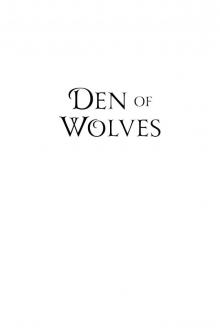 Den of Wolves
Den of Wolves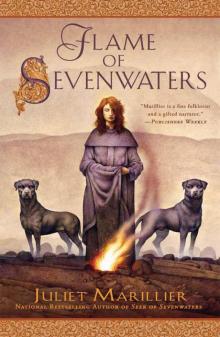 Flame of Sevenwaters
Flame of Sevenwaters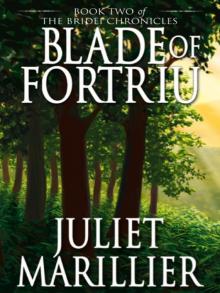 Blade of Fortriu
Blade of Fortriu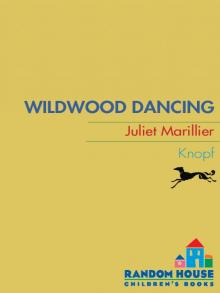 Wildwood Dancing
Wildwood Dancing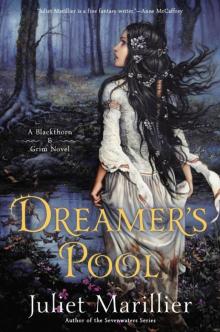 Dreamer's Pool
Dreamer's Pool Raven Flight
Raven Flight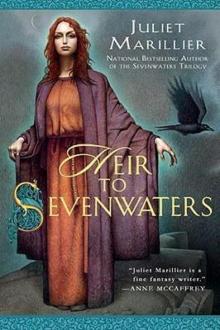 Heir to Sevenwaters
Heir to Sevenwaters The Dark Mirror
The Dark Mirror Daughter of the Forest
Daughter of the Forest Seer of Sevenwaters
Seer of Sevenwaters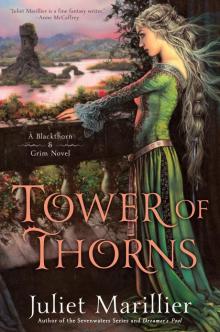 Tower of Thorns
Tower of Thorns Shadowfell
Shadowfell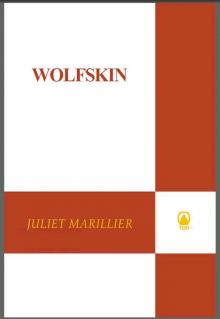 Wolfskin
Wolfskin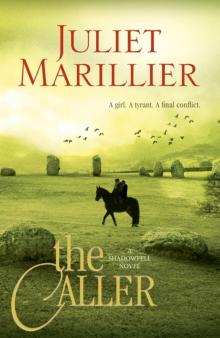 The Caller
The Caller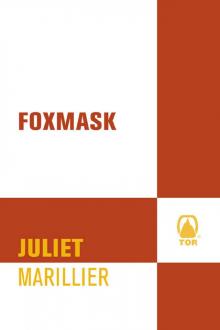 Foxmask
Foxmask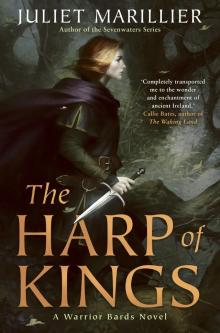 Harp of Kings
Harp of Kings The Well of Shades
The Well of Shades Heart's Blood
Heart's Blood Child of the Prophecy
Child of the Prophecy Twixt Firelight and Water
Twixt Firelight and Water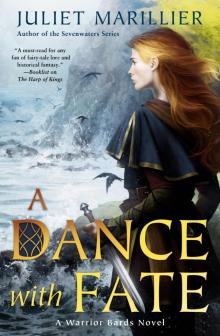 A Dance with Fate
A Dance with Fate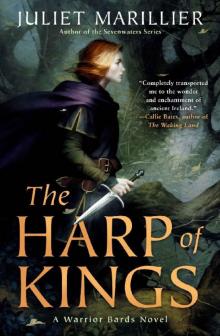 The Harp of Kings (Warrior Bards)
The Harp of Kings (Warrior Bards)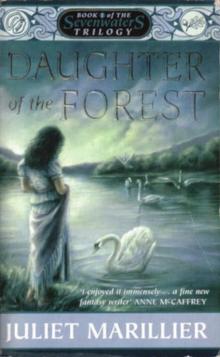 Daughter of the Forest (The Sevenwaters Trilogy)
Daughter of the Forest (The Sevenwaters Trilogy)![Sevenwaters [06] Flame of Sevenwaters Read online](http://i1.bookreadfree.com/i2/04/08/sevenwaters_06_flame_of_sevenwaters_preview.jpg) Sevenwaters [06] Flame of Sevenwaters
Sevenwaters [06] Flame of Sevenwaters![[Sevenwaters 04] Heir to Sevenwaters Read online](http://i1.bookreadfree.com/i2/04/12/sevenwaters_04_heir_to_sevenwaters_preview.jpg) [Sevenwaters 04] Heir to Sevenwaters
[Sevenwaters 04] Heir to Sevenwaters